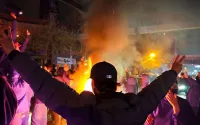31 July 2006David Clark
As if we didn't know it already, the conflict in Lebanon shows that truth and war don't mix. All parties to the tragedy of the Middle East resort to disinformation and historical falsification to bolster their case, but rarely has an attempt to rewrite the past occurred so soon after the fact. Israeli ministers and their supporters have justified the bombardment of Lebanon as "a matter of survival". Total war has been declared on Israel, so Israel is entitled to use the methods of total war in self-defence. This would be reasonable if it were true, but it isn't. It's completely false.
The conflict was triggered by a Hizbullah operation in which two Israeli soldiers were captured and three killed. Let's be frank, this wasn't exactly the Tet offensive. It certainly didn't justify Israel's ferocious onslaught against the very fabric of Lebanese society. Yes, the rocket attacks on Haifa are an appalling crime, but they followed rather than preceded Israel's decision to escalate the fighting. They cannot provide retrospective justification for Israeli strategy.
The crisis has also been accompanied by the selective and often inappropriate use of the term "terrorism". Following the Israeli government, George Bush and Tony Blair were at it again on Friday, blaming "terrorists" for sparking the conflict. The purpose behind this is obvious enough. In the context of America's war on terror, anyone claiming to be engaged in the fight against this most contested of notions gets carte blanche to do as they please. But the result has been to politicise the term in ways that render it effectively useless as a category of moral judgment or policy analysis.
It is certainly true that Hizbullah has been linked to a string of classic terrorist attacks going back more than 20 years, including suicide bombings against civilian targets, hostage-taking and the hijacking of a TWA flight. A particularly vile example was the 1994 bombing of a Jewish community centre in Buenos Aires in which 85 people were murdered. Hizbullah strongly denies involvement, but the truth is probably murkier than either side pretends. Responsibility for these attacks has often been attributed to Hizbullah's External Security Organisation (ESO), a unit believed to be under the operational control of Iranian intelligence rather than the Hizbullah's Lebanese leadership. Britain is one country that draws this distinction, proscribing ESO, but not Hizbullah itself, under the Terrorism Act.
Interestingly, some of the earliest suicide bombings commonly attributed to Hizbullah, such as the 1983 attacks on the US embassy and marine barracks in Beirut, were believed by American intelligence sources at the time to have been orchestrated by the Iraqi Dawa party. Hizbullah barely existed in 1983 and Dawa cadres are said to have been instrumental in setting it up at Tehran's behest. Dawa's current leadership includes none other than the new Iraqi prime minister, Nuri al-Maliki, feted last week in London and Washington as the great hope for the future of the Middle East. As the old saying goes, today's terrorist is tomorrow's statesman - at least when it suits us.
None of this should be read as exonerating Hizbullah of the charge that it uses terrorist tactics. Irrespective of anything else, the use of Katyusha rockets against Israeli population centres is clearly intended to inflict terror and suffering on civilians. It deserves a response. But the allegations of terrorism levelled at Hizbullah (as well as Hamas and other groups) by America and Israel go well beyond the targeting of non-combatants. The US state department's annual reports on terrorism also list operations carried out against the Israeli Defence Force as examples of terrorism. The US government justifies this conclusion by way of a logical contortion that defines Israeli troops as "non-combatants", despite the fact that Israel continues to occupy territory in Lebanon and Palestine with military force. The intention is not just to stamp out terrorism as commonly understood, but also to stigmatise perfectly legitimate acts of resistance.
Terrorism has always been extraordinarily difficult to define, but the American approach lacks any pretence at objectivity, thus making the term utterly meaningless. Used in this way, terrorism becomes simply "political violence of which we disapprove". The answer, of course, must not be to abandon any attempt to distinguish between right and wrong in the use of force. There need to be standards if we are to prevent the free-for-all of violence without limit. But these standards must be disinterested, legitimate and robust. As it happens, most of what we need is adequately provided for in international humanitarian law. Numerous treaties and judgments from the Geneva conventions onwards set out quite detailed rules governing the use of force, including the principles of proportionality and civilian immunity.
Under international law, there can be no doubt that many of the actions carried out by Hizbullah and Hamas constitute war crimes that must be punished. The reason it has been disregarded for the purposes of fighting terrorism is that, rather inconveniently for the governments concerned, it applies to states as well as non-state groups. Accepting it would leave them open to unwanted scrutiny and possibly even prosecution for war crimes of their own. In the case of the Israeli government, it isn't hard to see why. Israeli doctrine eschews the principle of proportionality in favour of massive retaliation, as has been amply demonstrated in Lebanon and Gaza.
Despite Israel's protestations that it is doing everything it can to avoid civilian casualties, it is clear that its military strategy is aimed at maximising the suffering of the Lebanese people as a whole. This was declared quite openly on day one of the campaign, when Israel's chief of staff, General Dan Halutz, promised to "turn back the clock in Lebanon by 20 years", and confirmed again yesterday with the horrific slaughter at Qana. The approach is identical to the one taken in similar operations in 1996 and 1993, when Yitzhak Rabin admitted: "The goal of the operation is to get the southern Lebanese population to move northward, hoping that this will tell the Lebanese government something about the refugees, who may get as far north as Beirut." Populations will move like this only if they are in fear of their lives.
The same applies to Gaza, where the pretence at discrimination is even thinner and Palestinian civilians are being subjected to a brutal siege and acts of violence that have no military justification. As in Lebanon, the intention is to force civilians to turn on the militias by inflicting as much pain and suffering as the Israeli government thinks it can get away with. What is this if it is not terrorism? It is certainly a war crime. So let's hear no more hypocritical utterances about the evils of terrorism from Bush and Blair. Not until they are able to speak with genuine moral authority by condemning all forms of illegal violence, irrespective of who commits them.
· David Clark is a former Labour government adviser [email protected]
#comments { font-size:70%; font-family:Geneva, Arial, Helvetica, sans-serif;}#comments div.commentheader p { font-size:1.2em;}#comments { clear:both; margin-top:25px; width:256px;}#comments h3 { color: #fff; padding:2px; margin-bottom: 10px; font-size:1.3em; background-color:#999;}.individualcomment { font-size:1.2em; clear:both; margin-top:10px; padding-top:10px; border-top:1px solid #999;}.dateline { font-weight: normal; color:#999; padding-top:2px; margin:0 0 15px 0;}.byline { font-weight:bold; padding:0; margin:0;}





